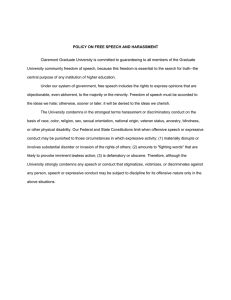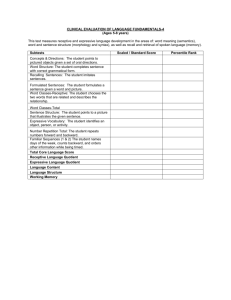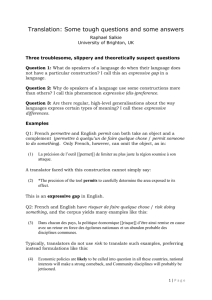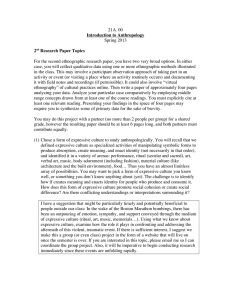Campus Policy on Freedom of Expression
advertisement
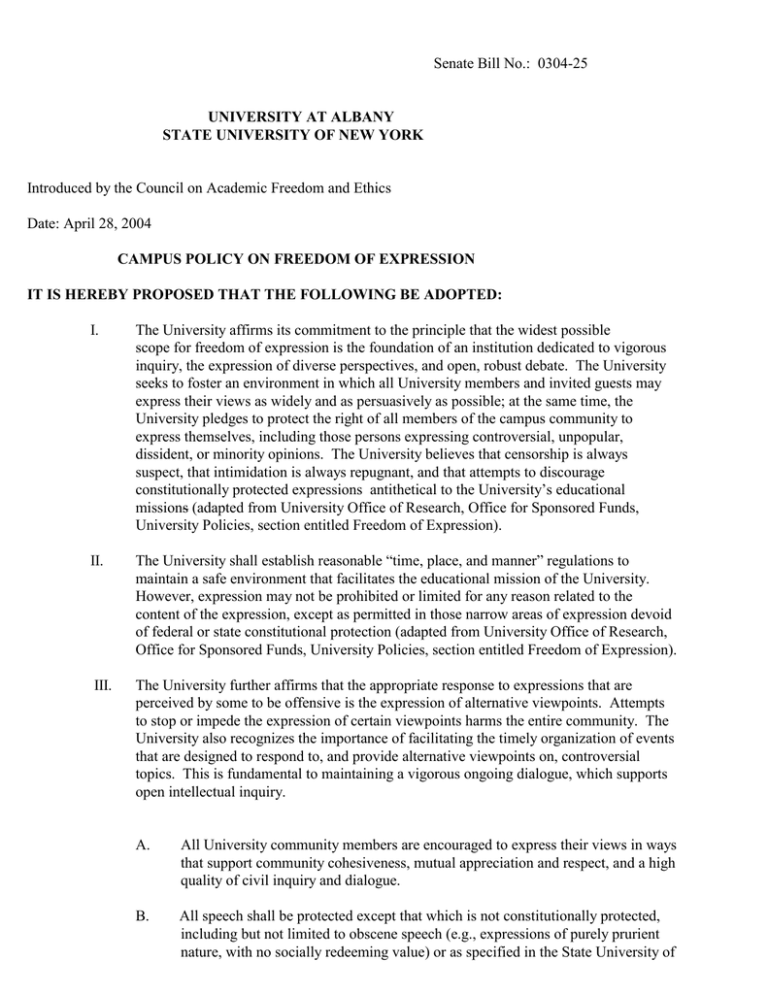
Senate Bill No.: 0304-25 UNIVERSITY AT ALBANY STATE UNIVERSITY OF NEW YORK Introduced by the Council on Academic Freedom and Ethics Date: April 28, 2004 CAMPUS POLICY ON FREEDOM OF EXPRESSION IT IS HEREBY PROPOSED THAT THE FOLLOWING BE ADOPTED: I. The University affirms its commitment to the principle that the widest possible scope for freedom of expression is the foundation of an institution dedicated to vigorous inquiry, the expression of diverse perspectives, and open, robust debate. The University seeks to foster an environment in which all University members and invited guests may express their views as widely and as persuasively as possible; at the same time, the University pledges to protect the right of all members of the campus community to express themselves, including those persons expressing controversial, unpopular, dissident, or minority opinions. The University believes that censorship is always suspect, that intimidation is always repugnant, and that attempts to discourage constitutionally protected expressions antithetical to the University’s educational missions (adapted from University Office of Research, Office for Sponsored Funds, University Policies, section entitled Freedom of Expression). II. The University shall establish reasonable “time, place, and manner” regulations to maintain a safe environment that facilitates the educational mission of the University. However, expression may not be prohibited or limited for any reason related to the content of the expression, except as permitted in those narrow areas of expression devoid of federal or state constitutional protection (adapted from University Office of Research, Office for Sponsored Funds, University Policies, section entitled Freedom of Expression). III. The University further affirms that the appropriate response to expressions that are perceived by some to be offensive is the expression of alternative viewpoints. Attempts to stop or impede the expression of certain viewpoints harms the entire community. The University also recognizes the importance of facilitating the timely organization of events that are designed to respond to, and provide alternative viewpoints on, controversial topics. This is fundamental to maintaining a vigorous ongoing dialogue, which supports open intellectual inquiry. A. All University community members are encouraged to express their views in ways that support community cohesiveness, mutual appreciation and respect, and a high quality of civil inquiry and dialogue. B. All speech shall be protected except that which is not constitutionally protected, including but not limited to obscene speech (e.g., expressions of purely prurient nature, with no socially redeeming value) or as specified in the State University of New York Board of Trustees “Rules and Regulations for the Maintenance of Public Order,” 8 N.Y.C.R.R.§535.3. IV. Members of the University community may conduct or sponsor organized expressive activities in designated outdoor areas of the University in accordance with procedures approved by the Office of the President. Such procedures may include, among other things, a requirement that space for the conduct of expressive activities be scheduled in advance with the University. The University may impose constitutionally permissible time, place and manner restrictions on expressive activities. Time, place and manner restrictions on expressive activities are permissible provided they are unrelated to the content of the expressive activity, are narrowly tailored to serve the University’s educational mission and leave open ample alternative channels for communication. Decisions to grant or deny permission to conduct expressive activities shall be based upon adherence to applicable University procedures, local, state and federal law and the availability of space. In no event should the decision be based on the content or viewpoint of the expressive activity or upon the anticipated reaction of others to the expression. When an expressive event or speech is disallowed or restricted, a written explanation describing the grounds for the denial or restriction shall be supplied to the event sponsor by the designated University administrator. A. Only University groups which have official recognition may sponsor events and invite non-university members or groups to participate in expressive events on campus. B. Persons engaged in expressive activities and those in attendance at such events are expected to demonstrate civility, concern for the safety of persons and property, respect for University activities, respect for those who may disagree with their message or viewpoint and compliance with all applicable University policies and regulations and applicable local, state and federal laws. C. All events, organized by University members and recognized University groups, other than formal academic units, shall be registered with an administrative office to be designated by the University President. This registration process shall require event organizers to provide information, including, but not limited to, the sponsor, location, time, title and a brief description of an event. A complete, electronic listing of all registered events shall be maintained and made available to the University community. D. The University’s established policies for the approval and posting of event advertisements on University property shall govern the approval and posting of event advertisements for expressive activities under this policy. E. The use of props, banners, and other displays used in events may be limited in cases where public safety is at risk or where such paraphernalia includes expressions that are not constitutionally protected. V. In addition to planned events, the University recognizes the need to support spontaneous expressions and free speech of members of the University community. Such expressions may be permitted by the University, without prior reservation, only in such area or areas as may be designated by the University and subject to regulations governing such activities as may be promulgated by the University. Such regulations may include, but shall not be limited to, a prohibition of amplified sound, prohibition of stationary displays, exhibits or structures and a limitation on the period of time during which such activities may be conducted. A. To protect the educational mission, the University may prohibit electronic or other sound amplification equipment in connection with spontaneous expressions and free speech. B. All community members shall respect the right of free speech and not attempt to interfere, heckle or otherwise prohibit the speech of others; instead, they may express alternative views during their turn to speak. VI. Complaints and alleged violations of this policy should be referred to the Committee on Academic Freedom, Freedom of Expression and Community Responsibility (formerly known as the Council on Academic Freedom and Ethics). This Committee will serve as a hearing body available to those members of the University community who feel their freedom of expression has been unfairly denied or limited. The Council will review the circumstances and report its findings to the President for further review and action. VII. This policy is applicable to University at Albany students, faculty, staff and their invited guests who wish to engage in organized expressive activities on property owned, leased or under the control of the University. It does not apply to official University activities, e.g., commencement, faculty receptions, and other similar functions. Groups or individuals engaged in organized expressive activities as provided herein shall be responsible for the content of their expression. Permitting organized expressive activities under this policy does not constitute official University endorsement of the content of the expressive activities. VIII. That the bill be forwarded to the President for approval and implementation, including the development and promulgation of guidelines and procedures to effectuate its purposes. RATIONALE Robust, wide-open expressions of ideas in peaceful assembly and without restrictions on content are central to the educational mission of the University. The University has a legitimate right to regulate “time, place and manner” of expression, to maintain the educational mission and to provide a safe environment for all University members. The proposed bill represents an effort to reaffirm the right of free speech at the University at Albany, to help educate community members and support a better understanding of the rights and responsibilities of freedom of expression. Current guidelines are detailed with respect to student groups; however, policies governing freedom of expression for all University members are not well specified. Also, existing policies focus on, and provide guidelines for, the conduct of organized events but give little or no reference to spontaneous free speech. Furthermore, much of the centrally located outdoor areas, especially of the uptown campus, are currently reserved for scheduled events (e.g. information tables, lunchtime amplified events). The Council on Academic Freedom and Ethics was advised by faculty and staff with expertise in constitutional rights and legal practices related to freedom of expression and speech, especially related to college campuses. In addition, the Council reviewed available policies on freedom of expression for Florida State University, the University of Georgia, Oregon State University, University of Houston, Arizona State University, University of Vermont, University of Delaware, UC Berkeley, SUNY Brockport and SUNY Binghamton. A wide variety of freedom of expression issues were covered and these policies often appeared to reflect particular historical experiences of a university. For example, one university had a policy dealing specifically with the appropriate use of “symbolic structures.” In addition, freedom of expression policies are in some instances addressed explicitly and in other cases integrated into broader general policy statements. It may be postulated that universities with more prominent policy affirmations of freedom of expression may experience more active participation in such activities.
